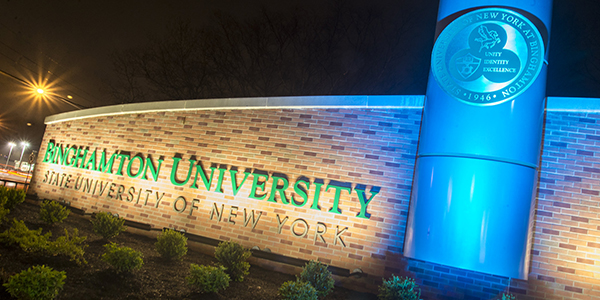Binghamton University establishing Violence, Abuse and Rape Crisis Center
Center is being developed with input from students

Binghamton University this spring is establishing a Violence, Abuse and Rape Crisis Center (VARCC) on campus.
To be housed in a centrally located, but calm, private space on the third floor of Old Johnson Hall, the VARCC will provide one place for support and services to students. It will have a soft opening in mid-March with a more formal and celebratory opening in early April in commemoration of Sexual Assault Prevention month.
A major benefit of the VARCC is that it will be a single place for students and anyone who wishes to report an incident of sexual violence. “It will be a colocation of services,” said Johann Fiore-Conte, associate vice president for student affairs and chief health and wellness officer. “We know it’s traumatic for students who wish to report to have to repeat their story to multiple offices and we are hoping that with better coordination of services, we can improve that.
“The beauty of the VARCC is that it will be a place where multiple services are coordinated so we can respond efficiently and as supportively as possible to the students,” she said.
Included in the key resources to be housed in the VARCC are:
- Sexual assault advocate
- Deputy Title IX coordinator
- Bystander training coordinator
- Office of Student Conduct
- University Police Department, BPD/University Liaison, NYS Investigator (and other jurisdictions)
- Crime Victims Assistance Center (CVAC)
- Counselor specializing in trauma recovery
- Binghamton University Interfaith Council representatives and/or other service providers, etc.
Fiore-Conte said that not all of the offices will staff the center full time, but will rotate through and people will be pulled in as needed so students can meet with them at one time.
“We’re also trying to develop a healing space within the VARCC,” she added. “There’s research that supports the healing effects of a secure, comfortable space that provides opportunities for support, art therapy, journaling, crafting, etc. We’re hoping to build that into the new space.”
The University has a framework in mind, but is looking to hear from students to work collaboratively with them. Initial meetings with student organizations including DOVE, the Student Association, the Graduate Student Organization and the Women’s Student Union have been held or are scheduled.
Fiore-Conte reinforced that, though there is a perception that the CVAC hasn’t had much of a presence on campus, that it and other external supports will be key to the VARCC. “It’s not yet nailed down, but I believe the CVAC will have regular hours there, and we’re talking about how we can develop a stronger partnership and greater sources of support for our students. These conversations are actively occurring now.
“We’re also talking with the CVAC about helping us establish more of a 24/7 operation, so if reports come in after hours or on weekends, the CVAC could supply some of those supports,” she said. ” We currently have a sexual assault advocate on campus, however, students sometimes prefer off-campus resources. We are working with the CVAC to create options for students, and greater access and availability of services. Services for the accused party will continue to be coordinated out of the CARE Team.”
There could be additional offices pulled in to the VARCC over time, Fiore-Conte added. “We genuinely have shared goals with the students,” she said.
